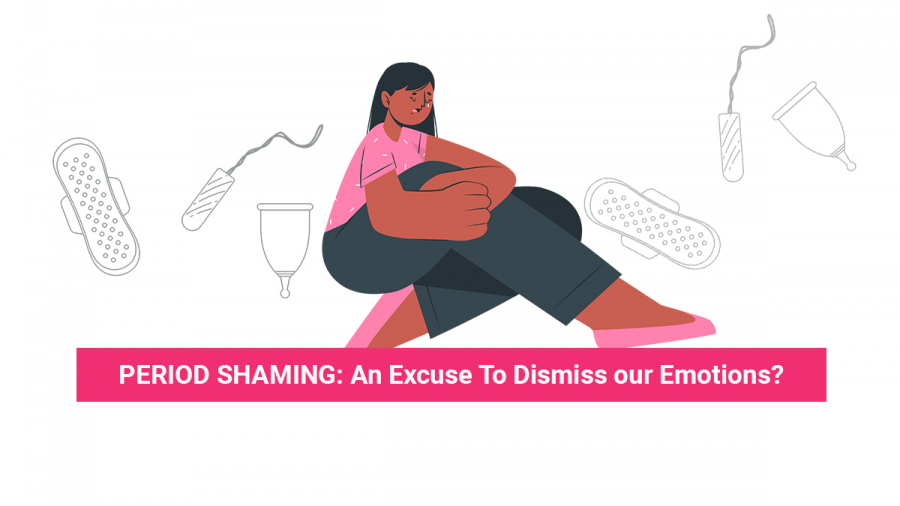The year was 2006, you wore a white skirt to school only for others to make you feel embarrassed when they see a red stain on your skirt.
You’re in 7th grade, watching TV and a vague sanitary pad advertisement appears which makes you believe that our blood is colored blue.
You go to buy tampons/sanitary napkins and the shopkeeper uses all the newspaper he has to cover the packet up while giving it to you so that no one notices what you just purchased.
Let us take another instance, back in school while teaching reproduction, there used to be separate sessions for boys and girls wherein the girls were explained about periods in detail, whereas the boys were hardly taught in detail.
Nostalgic much? Most of us have faced similar kind of situations at one point or the other in our lives. Menstruation as we know is a natural biological process and yet we shy away from talking about it in public or worse, stigmatize it. Be it a college in Gujarat forcing over 60 undergraduate hostellers to remove their undergarments to prove that they were not menstruating or the claims of around 70 girls aged about 10 that they were asked to strip naked by their female warden to check for menstrual blood, in a residential school in Uttar Pradesh, the question that arises in one’s mind is that why do we, as a society attach taboo to menstruation? On the other hand, we watch these action-packed movies where their makers have no problem with showcasing blood spilling all over in the action scenes. One of the reasons for this might also be that we, as a society are disgusted with the menstrual blood alone and consider it impure.
In fact, the Gujarat High Court while hearing a PIL filed in relation to the incident of 60 girls being forced to remove their undergarments, observed that the stigma around menstruation has been built up because of the traditional beliefs in impurity of menstruating women and the unwillingness of the society to discuss it normally.
Interestingly enough, the Kamakhya temple in Guwahati worships Kamakhya Devi who is also known as the ‘Bleeding Goddess’. It is known that the mythical womb and vagina of the goddess is housed in the ‘Garvagriha’ of the temple and every year in June, the Brahmaputra river near Kamakhya turns red which is believed to happen due to the goddess Shakti menstruating during that month. While we celebrate this, we also ask our daughters to stay out of the kitchen or not allow them to come out of their rooms, on the other hand.
We would be lying if we did not acknowledge the fact that this unfortunate behaviour begins at our homes. From mothers not talking to their sons about it to treating their daughters like they are ‘untouchables’, all this facilitates in creating a lack of awareness about the topic of menstruation. In fact, according to a survey conducted by the World Health Organization (WHO) back in 2017, it was revealed that around 43% of women don’t have access to sanitary essentials at the initial stage of their periods and 36% of them felt uncomfortable in buying them with other customers around. Further, over 45% of women believed that menstruation is still a taboo in India.
Bangalore Times spoke to a few students about this issue and this is what a girl had to say – “The change needs to start from home with mothers teaching their sons about periods and fathers don’t mind buying pads for their daughters”
This lack of awareness around this topic results in the society dismissing the emotions of a woman who is assertively voicing her opinion or is disagreeing with the majority, by saying things like “Oh someone must be on their period!”, “Oh must be that time of the month!”, “Are you PMS-ing?”. This indirectly means that the society thinks women are incapable of having a rational thought process and are unable to accurately assess someone’s work. Back in the day, when the news anchor O’Reilly asked the author Marc Rudov as to what was the downside of a woman becoming the President of the US, Marc’s initial response was “You mean besides the PMS and the mood swings, right?” PMS jokes have been normalised to the extent that they are now used to discount women’s leadership skills, their authority and intelligence. All of this collectively leads to women being ashamed of their bodies and not being confident enough to stand up for themselves in turn crippling their self-confidence and mental health. In 2017, allegations were levelled that a 12-year-old took her own life after her teacher shamed her for a period stain on her uniform. Having open conversations about menstruation, education all sexes regarding the same at homes and at schools will play a significant role in busting myths and stereotypes which encircle this topic. Things, no doubt, are changing gradually but there still remains a lot of right that needs to be done for all the wrong that has been inflicted on menstruating women.
– Esha Shah, Paralegal
 Cart is empty
Cart is empty



